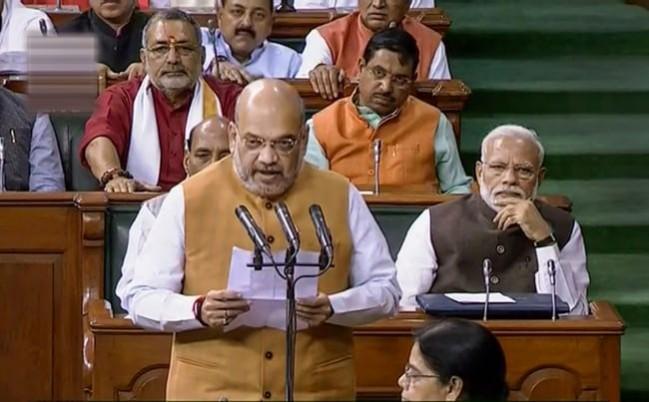
Union Home Minister Amit Shah will present the Jammu and Kashmir Reservation Amendment Bill in the Lok Sabha on Monday, June 24. This will be Shah's first legislative business in Parliament after his election.
The bill was earlier introduced as an ordinance, which was approved by the Union Cabinet on February 28. It was also cleared by President Ram Nath Kovind.
Amit Shah had vowed to scrap Article 370 of the constitution that allows Jammu and Kashmir its own constitution, flag and the right to handle its own laws except on matters that impact national security during the campaign in the run-up to the recently concluded election.
The Bharatiya Janata Party's manifesto had also mentioned the scrapping of Article 35A, which defines permanent residents of the state and excludes outsiders from owning property and getting benefits including government jobs.
The J&K Reservation Amendment Bill aims to give reservation benefits for education, jobs and promotion to the scheduled castes and tribes, and to the economically weaker sections in Jammu and Kashmir. It will benefit more than 36 lakh residents, according to the officials.
Here's all you need to know about the bill that is set to replace the ordinance:
What does the bill say?
The bill is set to replace the ordinance, which was approved in February.
Difference between an Ordinance and a Bill:
While an ordinance is a temporary law which is circulated by the President of India on the recommendation of the Union Cabinet, a bill can be introduced by government itself or proposed by a member of the Parliament.
A bill is a proposal to make a new law and can be considered as initial stage of an act. A bill is usually in the form of a document that summaries what is the policy behind the proposed law and what will be proposed law be.
A Bill is presented in the lower house of the parliament and after discussions, upon being passed, goes to the Upper house for approval. After the approval by the Upper house, the bill is sent to the President for his assent, after which, it becomes a law.
Whereas, an ordinance is approved when the parliament is not in session but there is a need to make an Act. In such cases, the government refers a proposal to the President or Governor, and upon their approval, it becomes an ordinance.
About the ordinance to provide 10 per cent reservation for economically weaker sections in Jammu and Kashmir, an official explained, "In this case, we plan to introduce a Bill replacing the ordinance. If it is not cleared during the House sitting, we will have to seek approval from the President for its (ordinance's) re-promulgation."
The bill will amend the Jammu and Kashmir Reservation Act, 2004, which provides for reservation in appointment and admission in professional institutions for persons belonging to Scheduled Castes, Scheduled Tribes, and socially and educationally backward classes.
While it defines the Socially and educationally backward classes to include persons living in areas adjoining the Actual Line of Control, the bill amends this to include those persons living in areas adjoining International Border, within the ambit of this reservation.
"Once the Ordinance is issued, it would pave the way for bringing persons residing in the areas adjoining international border within the ambit of reservation at par with persons living in areas adjoining actual Line of Control," said Arjun Jaitley, after the ordinance was approved earlier this year.
The bill makes 10 per cent reservation for economically weaker sections (which includes Scheduled Castes, Schedule Tribes) applicable in educational institutions and government job in addition to the existing reservation, in J&K.
In addition to this, while the Reservation Act of 2004 stated that any person, who has been appointed on the basis of residence in an area adjoining the Line of Control, must serve in such areas for at least seven years, the bill extends condition to persons living in areas adjoining the International Border as well.
What can be the impact of this bill?
The bill is being presented in Lok Sabha even as the J&K High Court issued notices to the Centre and the State, seeking their replies by July 10 on a petition challenging the ordinance.
After the ordinance was approved, the Union Home Ministry had said it will bring people living near the International Border on par with those living near the Line of Control. "Due to continuous cross border tensions, persons living alongside International Border suffer from socio-economic and educational backwardness," it added.
"Shelling from across the border often compels these residents to move to safer places and is adversely impacting their education as Educational Institutions remain closed for long periods. Hence, it was felt justifiable to extend the reservation benefits to persons residing in the areas adjoining International Border on the similar lines of the persons living in areas adjoining Actual Line of Control (ALoC)," it added.
About the reservation for economically weaker sections, it said that the ordinance would pave the way reserving State Government jobs to the youth of J&K who are from economically weaker sections belonging to any religion or caste.
The 10 per cent reservation for economically weaker sections was introduced in rest of the country through the 103rd Constitution Amendment in January 2019.
According to officials, the bill will not have any impact on Article 35-A, which provides special rights and privileges to the permanent residents of J&K.













